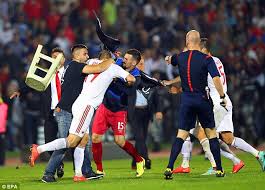By Andrew Warshaw
October 16 – Amid the furore of claim and counter-claim following one of the worst outbreaks of politically-motivated trouble in recent European football history, UEFA as expected have charged both the Serbian and Albanian federations – and will almost certainly come down hard on both of them.
This week’s Euro 2016 qualifier, played without away fans due to the ongoing tensions between the two countries, was abandoned after a remote-controlled drone carrying a flag of ‘Greater Albania’ was flown over the pitch causing an extraordinary melee between rival players.
The match was the Albanian national team’s first visit to Belgrade since 1967, since which time the largely ethnic Albanian province of Kosovo declared independence in 2008 and is seeking full recognition from FIFA.
As the entire region digested the appaling scenes, Serbs accused the Albanians of a “pre-planned terrorist action” while UEFA were forced to defend pairing the countries together in the same group despite its policy of keeping apart certain political opponents to avoid possible clashes.
Serbian media, and the country’s foreign minister, put the blame on the brother of Edi Rama, the Albanian prime minister, with some suggesting that he had been arrested in the VIP stands of the stadium with the remote control in his hands.
Olsi Rama, a US citizen, confirmed that he had been held by police but denied he had been arrested and said he was not behind the incident, with an Albanian fans’ group on Facebook called The Smugglers later appearing to take the credit.
The incident was immediately condemned by UEFA president Michel Platini. “Football is supposed to bring people together and our game should not be mixed with politics of any kind. The scenes in Belgrade last night were inexcusable,” he said.
FIFA president Sepp Blatter also waded into the debate, adding: “Football should never be used for political messages. I strongly condemn what happened in Belgrade.”
UEFA formally charged Serbia with setting off fireworks, crowd disturbance, a pitch invasion, “insufficient organisation” and the use of a laser pen. Albania were charged with refusing to play and the “display of an illicit banner”.
Branislav Ivanovic, the Chelsea defender, said Serbia wanted to play on but that their Albanian opponents were “unfit physically and mentally” to return to the field. According to the Serbians, they asked UEFA to finish the match, which was goalless at the time, after emptying the stadium or to replay it this week, but said the Albania FA refused.
Yet given Serbian football’s dreadful record of unrest in recent years, if the charges are proved they can be expected to be ordered to play several games behind closed doors, starting with next month’s qualifier against Denmark.
Both Tuesday’s culprits have been given seven days to plead their case, with UEFA’s disciplinary committee due to rule on October 23 on sanctions and, crucially, how the points should be apportioned.
When the drone hovered into view and was grabbed by a Serbian player, several Albanians attempted to snatch it from him. Television pictures showed Serbian fans and stewards attempting to attack the Albanian players and following a half-hour wait, English referee Martin Atkinson, abandoned the match altogether.
When the Albanian squad returned to Tirana they received a heroes’ welcome from about 3,000 fans. The prime minister praised the players on Twitter for “the pride and joy they gave us”.
In a rambling 1,500-word statement the Serbian FA placed the blame for the incident firmly on the Albanian players and officials, claiming they were “accomplices” to a plan that was a “pre-planned terrorist action”.
“The incident itself and the behaviour of the Albanian players, coach and staff leaves no room for doubt that they were part of a synchronised plan to stop the match,” the FSS claimed.
“It was a well-planned political diversion and, at the end of the day, it was the key factor which led to the match being abandoned,” it added. “We also wish to point out that the home Serbia fans displayed no offensive banners at any point in time.
“However, there is no excuse for the pitch invasion by some individuals and after reviewing the footage the FSS will press charges against the offenders.”
UEFA defended its decision not to keep the two nations apart as was the case with Spain and Gibraltar, and Armenia and Azerbaijan.
A spokesman said three criteria were used to determine whether two countries should be separated: whether they had normal diplomatic relations, whether there was an ongoing military or armed conflict and whether there had been a request made by either national association.
In this case, Serbia and Albania had normal diplomatic relations, were not engaged in an armed conflict and had not requested to be kept apart.
“When the draw was made there was no negative reaction from either side at the time. But both associations agreed not to take their own supporters to away matches. UEFA fully supported this move,” said the spokesman. “All the conditions were met at the time. There was no clear reason why these teams should be kept apart.”
Contact the write of this story at moc.l1744321407labto1744321407ofdlr1744321407owedi1744321407sni@w1744321407ahsra1744321407w.wer1744321407dna1744321407

